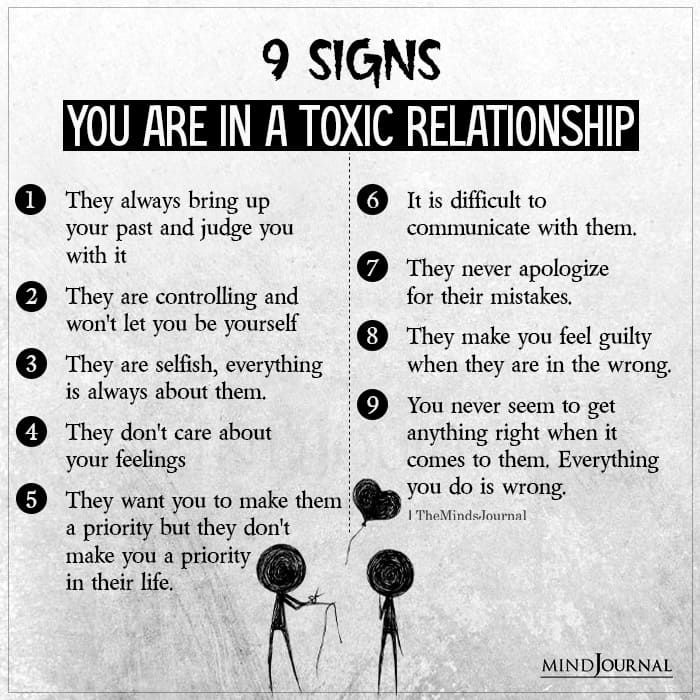Recognizing a toxic relationship can be challenging. You might feel confused, hurt, or trapped. But you are not alone in this. Relationships should bring joy and support, not constant stress and pain. Toxic relationships can sneak up on anyone. They often start well but become harmful over time. Understanding the signs is the first step to regaining control.
This guide will help you identify if your relationship is toxic. It will also offer practical steps to improve your situation. Knowing what to look for can make a world of difference. Let’s explore how you can protect your well-being and find a path to a healthier life.

Identifying A Toxic Relationship
Recognizing a toxic relationship is the first step toward finding peace. Such relationships can harm your mental and emotional well-being. Knowing the signs can help you decide the next steps. Below are key red flags and emotional abuse indicators that can help you identify a toxic relationship.
Common Red Flags
Toxic relationships often show clear signs. Frequent arguments, even over small issues, can signal trouble. One partner always controlling the other’s actions or decisions is another red flag. Isolation from friends and family is a major warning. If you feel drained or unhappy most of the time, it’s a sign. Pay attention to patterns that make you feel less valued.
Emotional Abuse Indicators
Emotional abuse is often subtle but damaging. Constant criticism can erode your self-esteem. Name-calling or belittling remarks are clear signs. Emotional manipulation, like making you feel guilty for their actions, is common. If they often play the victim or shift blame to you, it’s toxic. Watch out for silent treatment or sudden mood changes meant to control you.
Recognizing Manipulative Behavior
Recognizing manipulative behavior is crucial in identifying a toxic relationship. Manipulative behavior often includes subtle tactics that can undermine your confidence and well-being. Understanding these behaviors is the first step toward regaining control of your life.
Gaslighting Tactics
Gaslighting is a common form of emotional abuse. It aims to make you question your reality. Here are some signs:
- Denying your experiences: Your partner denies events you know happened.
- Trivializing your feelings: They say you are too sensitive.
- Deflecting blame: They blame you for their actions.
These tactics can leave you feeling confused and powerless. It is essential to recognize and label these behaviors to maintain your sanity.
Controlling Actions
Controlling actions are another sign of manipulative behavior. Your partner may try to control various aspects of your life. Here are some common examples:
- Isolation from friends and family: They discourage you from seeing loved ones.
- Monitoring your activities: They constantly check up on you.
- Financial control: They control your money and spending.
These behaviors are often justified as “concern” or “caring.” But they are about power and control. Recognize these actions to protect your autonomy.
Impact On Mental Health
A toxic relationship can wreak havoc on your mental well-being. The effects can be subtle at first but grow over time. Recognizing these impacts is crucial for your mental health. Let’s explore how a toxic relationship can affect your mind.
Anxiety And Depression
Constant stress can lead to anxiety. You may feel on edge all the time. Simple tasks become overwhelming. Your mind races with worry. This can lead to depression, a feeling of deep sadness. You might lose interest in things you once enjoyed. These feelings aren’t normal and shouldn’t be ignored.
Loss Of Self-esteem
A toxic relationship can chip away at your self-esteem. You might feel worthless and doubt your abilities. Negative comments from a partner can make you believe them. Over time, you may see yourself in a negative light. This loss of self-worth can affect every part of your life.
Communication Breakdown
Communication breakdown is a clear sign of a toxic relationship. It involves a lack of understanding and respect. Poor communication leads to many problems.
Frequent Arguments
Do you find yourselves arguing all the time? Frequent arguments can be exhausting. They indicate deeper issues in your relationship. Arguments often stem from unresolved problems. They can also arise from a lack of trust. Constant fighting can wear you down emotionally. It can affect your mental health. In a healthy relationship, disagreements happen. But they should not be constant.
Silent Treatment
The silent treatment is another sign of a toxic relationship. Ignoring each other does not solve problems. It creates distance and resentment. Silence can be more hurtful than words. It shows a lack of willingness to communicate. Healthy relationships involve talking things out. They involve understanding each other’s feelings. If you experience the silent treatment often, it’s a red flag. It’s important to address this behavior. Open communication is key to resolving issues.
Isolation From Support System
Isolation from your support system can be a major red flag in a toxic relationship. This happens when your partner starts to cut you off from friends and family. It may begin subtly but can escalate over time. The goal of isolation is to make you dependent on them. Understanding the signs can help you take action.
Limiting Social Interactions
Your partner might stop you from seeing your friends. They might create excuses for you to stay at home. They could make you feel guilty about going out. Social events become rare or tense. This keeps you away from outside opinions and support.
Even online interactions can be limited. They may check your messages. They might ask for your social media passwords. This reduces your privacy and freedom. It also cuts off your emotional support.
Dependence On Partner
As you get isolated, you rely more on your partner. They become your main source of emotional support. This dependency can be unhealthy. It gives them more control over your life.
They might encourage this dependence. They could say things like, “I’m the only one you need.” Over time, this makes leaving harder. It creates a cycle that traps you in the relationship.
Financial Control
Financial control in a relationship can be a sign of toxicity. It often involves one partner dominating financial decisions. This control can make the other partner feel powerless and dependent. Understanding the signs of financial control is crucial. Here are two common tactics used in toxic relationships: monitoring expenses and restricting access to money.
Monitoring Expenses
A toxic partner may closely monitor your spending. They might question every purchase you make. This can make you feel like you are under constant surveillance. They might demand receipts or access to your bank statements. This behavior is meant to control and intimidate you. It can lead to feelings of guilt and anxiety about spending your own money.
Restricting Access To Money
Another tactic is restricting your access to money. They might give you an allowance and expect you to justify your spending. This can limit your financial independence. They might take control of joint accounts or credit cards. This makes it difficult for you to make financial decisions. Being financially dependent on someone can trap you in the relationship. It is important to recognize these signs and seek help.
Physical Abuse Warning Signs
Physical abuse can be hard to identify. It often starts subtly and gradually increases. Recognizing the signs early can help you take action. Below are some key indicators of physical abuse.
Unexplained Injuries
Unexplained injuries are a major red flag. These injuries might include bruises, cuts, or burns. Often, the person will have inconsistent explanations for these injuries.
Signs to watch for:
- Frequent and unexplained bruises.
- Injuries that do not match the explanation.
- Wearing clothes to hide injuries, like long sleeves in summer.
- Frequent accidents or falls.
Document these injuries if possible. Photos can be useful later. Seek medical help if the injuries are severe.
Fear Of Partner
Fear of a partner is another critical sign of physical abuse. This fear can show in many ways. The person may seem jumpy or anxious around their partner. They might always try to please them to avoid conflict.
Signs to watch for:
- Flinching or cowering when their partner moves.
- Constantly seeking approval from their partner.
- Avoiding social interactions without their partner.
- Making excuses for their partner’s behavior.
If you notice these signs, talk to the person. Offer your support. Encourage them to seek professional help.
Steps To Take For Safety
Recognizing a toxic relationship is the first step towards safety. It’s vital to take actionable steps to protect yourself. Here are some essential measures to consider.
Developing An Exit Plan
Creating an exit plan is crucial. Start by identifying a safe place to go. This could be a friend’s house or a family member’s home. Ensure you have access to important documents. This includes your ID, passport, and financial records. Pack a bag with essentials. Clothes, medications, and personal items are a must.
Practice your exit plan. Run through it a few times. This helps you feel prepared. Inform a trusted person about your plan. They can offer support and keep you accountable.
Seeking Professional Help
Professional help can provide crucial support. Therapists can offer coping strategies. They help you understand your emotions. Look for a therapist specializing in relationships. Many offer remote sessions. This increases accessibility and privacy.
Consider speaking with a legal advisor. They can inform you of your rights. Legal protection may be necessary. Seek advice on restraining orders or custody issues. Your safety should always be the priority.

Conclusion
Recognizing a toxic relationship is crucial for your well-being. Trust your feelings. Take action to protect your mental health. Speak to a trusted friend or counselor. Prioritize self-care and set boundaries. Toxic relationships drain your happiness and energy. Remember, you deserve respect and love.
Change is possible with support and determination. Your peace of mind matters. Choose a healthy, positive path forward.
